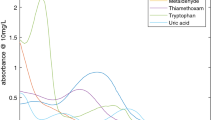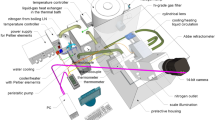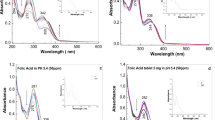Abstract
IT appears to be generally accepted that the spontaneous acidity of distilled water is due to dissolved carbon dioxide which can be expelled by boiling to restore the pH to about 7.0. Some of my recent work has involved a large number of experiments on the pH of water and staining solutions. This brought to light some interesting phenomena which may be of interest to research workers in the field of biology and medicine. In the first place it appears that freshly distilled water usually has a pH between 5.0 and 6.0, not 7.0. In the experiments referred to above, whatever the pH of the particular sample of distilled water at 20° C it rose gradually until at 100° C it had risen by pH 2.0. That is to say if at 20° C the pH of the water was 5.0, then at 100° C the pH became 7.0, and pH 5.5, for example, became 7.5 at 100° C. Graphs were perfectly linear in every case.
This is a preview of subscription content, access via your institution
Access options
Subscribe to this journal
Receive 51 print issues and online access
$199.00 per year
only $3.90 per issue
Buy this article
- Purchase on Springer Link
- Instant access to full article PDF
Prices may be subject to local taxes which are calculated during checkout
Similar content being viewed by others
Author information
Authors and Affiliations
Rights and permissions
About this article
Cite this article
GURR, E. Effect of Heat on the pH of Water and Aqueous Dye Solutions. Nature 195, 1199–1200 (1962). https://doi.org/10.1038/1951199b0
Issue Date:
DOI: https://doi.org/10.1038/1951199b0
This article is cited by
-
pH of Ionic Dye Solutions
Nature (1964)
Comments
By submitting a comment you agree to abide by our Terms and Community Guidelines. If you find something abusive or that does not comply with our terms or guidelines please flag it as inappropriate.



